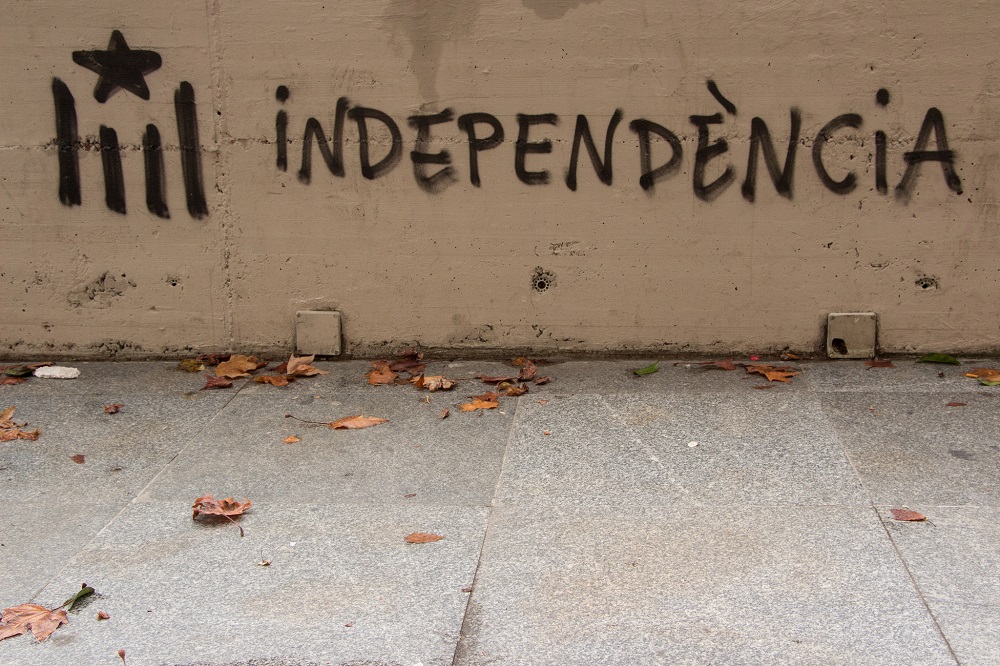Pro-independence parties set to win more than 50% of the vote in Catalan elections for the first time

Pro-independence parties have made gains in the Catalan elections and are set to win more than 50% of the popular vote for the first time.
With more than 95% of votes counted, the pro-independence block are on course to secure a comfortable majority after collectively gaining four seats and increasing their vote share from 47.5 to 51%.
The result was described as “the greatest victory for independentists since the restoration of democracy” by the spokesperson of the JuntsxCat party.
All three pro-independence parties have all said winning a majority of all votes would represent a mandate for a new referendum, although securing an amnesty for politicians imprisoned and exiled for their part in the last referendum will be the first priority of the new government.
Within the pro-independence block, there has been a significant shift to the left. Esquerra Republicana (Republican Left) won 33 seats at the expense of Puigdemont’s JuntxCat (Together for Catalonia) party who went from 34 in 2017 to 32. The radical left CUP gained five seats and polling showed they were the single most popular party among under-45s.
As Esquerra President Oriol Junqueras is still serving a 13-year prison sentence for organising the 2017 independence referendum, Pere Aragones will become the first Catalan president from Plaid Cymru’s sister party since Lluis Companys was executed after fascist forces won the Spanish civil war.
Aragones used part of his post-election speech to appeal in English for EU leaders to help negotiate a legal referendum with the Spanish government.
He said: “The results are clear, the pro-independence parties have a majority. We have reached more than 50% of the popular vote. The Catalan people have spoken, the time has come to negotiate a referendum of self-determination. Please get involved.”
| Pro-independence block in order of results:
Esquerra Republica, JuntsxCat, CUP |
1.28 million votes (51%) | 74 seats (+4) |
| Pro-union block:
Socialists, Vox, Ciudadanos, PP |
1m | 53 (-4) |
| Pro-referendum:
En Comu Podem |
178,000 | 8 (no change) |
No delay
There was also a swing to the left among pro-union parties, with the Socialists almost doubling their number of seats to 33 at the expense of the populist centre-right party Ciudadanos who were the biggest party in 2017 with 36 seats and now have just 6 seats.
However, far-right Vox have entered the parliament for the first time and become the second-largest unionist party with 11 seats.
The pandemic meant constitutional concerns weren’t top of voters’ minds for the first time in a decade and Socialists chose the perfect candidate to capitalise on a focus on health – Salvador Illa was until January overseeing Spain’s more centralised response to Covid-19 as federal health minister.
The Socialists won the same number of seats of Esquerra but won 48,000 more votes and insist they will exercise their right to form a government despite not having a viable majority as a result of a pact between pro-independence parties not to participate in a government led by Illa.
The pandemic also contributed to a crash in turnout from 79% to 53% despite exceptional measures put in place to enable the vote to take place.
Polling stations were only open to older and other at-risk voters for the first two hours of the election and the final hour was allocated to voters with Covid. Barcelona’s iconic Camp Nou stadium was one of a number of open-air polling stations and the volunteers staffing the centres had to take a Covid-19 test and wear protective clothing.
The Catalan government wanted to delay the election until May but were overruled by the Spanish courts.
Support our Nation today
For the price of a cup of coffee a month you can help us create an independent, not-for-profit, national news service for the people of Wales, by the people of Wales.






